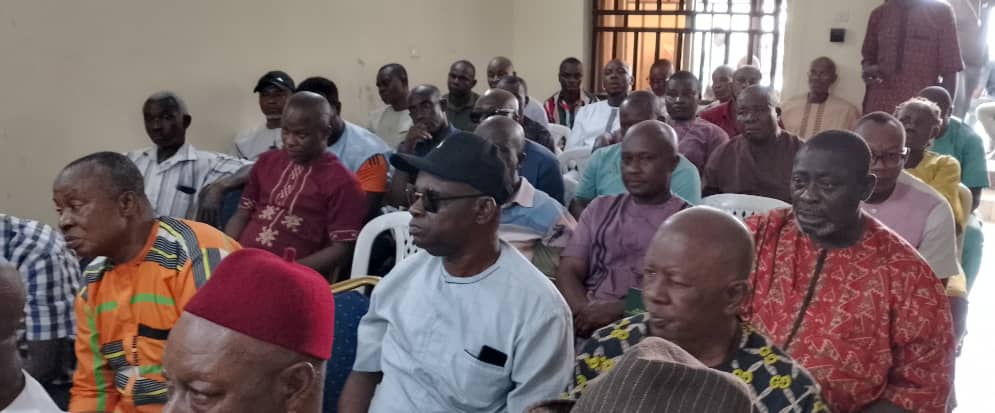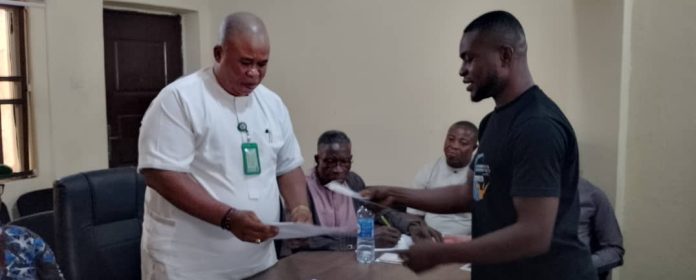In a critical move to advance the rights of Persons with Disabilities (PWDs), the FAECARE Foundation conducted a high-level advocacy visit to the National Union of Road Transport Workers (NURTW), Rivers State Chapter.
The advocacy meeting, which took place at the NURTW’s head office, was attended by the Rivers State Chairman of NURTW, Comrade Tom-George Boma, along with motor park leaders from various parks across the state.
The focus of the visit was clear – addressing the persistent barriers faced by PWDs in accessing public transportation and pushing for reforms that would promote inclusive and accessible transport services for all.
Highlighting the Barriers Faced by PWDs in Public Transportation
FAECARE’s Disability Right Initiative, under which this advocacy falls, is aimed at fostering accessibility and raising awareness on the challenges that PWDs face in their everyday lives, particularly regarding mobility. During the visit, FAECARE’s program officer laid out a series of concerns, noting that PWDs encounter numerous difficulties when using public transportation.
One of the key barriers identified was the negative attitudes exhibited by some public transport drivers towards passengers with disabilities. “There is a glaring impatience from drivers when they spot passengers with disabilities waiting to board. Instead of offering assistance, many drivers make wrongful assumptions, treating them as beggars or assuming they won’t be able to pay their fares,” the program officer explained. This type of discrimination, they added, extends to practices such as outright refusal to pick up passengers with disabilities or cases where drivers take advantage of visually impaired passengers who may struggle to count their change.
The program officer also detailed the more subtle, but equally damaging forms of discrimination that take place, such as drivers failing to stop at designated bus stops for passengers with disabilities or rushing them when they try to board. These actions, they noted, are rooted in deep-seated stereotypes and a lack of awareness, underscoring the need for training and sensitization within the transportation sector.

Recommendations for Accessible Transportation
To address these issues, FAECARE presented a series of recommendations aimed at promoting an inclusive and accessible transport system for PWDs in Rivers State:
- Non-Discrimination: Transport service providers must ensure that no PWD is discriminated against. Drivers should understand that all passengers, regardless of their physical abilities, have equal rights to access public transportation.
- Complete Stops at Bus Stops: Drivers must be required to bring their vehicles to a complete stop at bus stops, ensuring PWDs have ample time to board or alight from the vehicle safely.
- Clear Guidelines on Handling Passengers with Disabilities: NURTW and other relevant bodies should provide clear guidelines and instructions to transport workers on how to appropriately assist PWDs. This includes training on how to handle assistive devices, such as wheelchairs and crutches, and how to interact with PWDs in a respectful manner.
- Awareness Campaigns in Parks: FAECARE called for the implementation of awareness campaigns within motor parks to educate drivers, conductors, and passengers about the rights and needs of PWDs.
- Patience and Understanding: Drivers and conductors must demonstrate patience when assisting PWDs. It was emphasized that rushing them to board or alight could put them in danger or cause unnecessary stress.
- Attitudinal Improvement: A change in attitude is crucial for improving interactions with PWDs. Drivers and conductors need to show empathy, treat PWDs with respect, and ensure their safety while on the road.
- Assistance with Luggage and Assistive Devices: Drivers and conductors should be encouraged to assist PWDs with carrying their luggage and any assistive devices, ensuring they are comfortably seated before the journey begins.
- Protection from Abuse: FAECARE highlighted the need for drivers and conductors to actively protect passengers with disabilities from any form of harassment or abuse, which could come from fellow passengers or even within the transportation system itself.
FAECARE stressed that these measures are vital to creating an inclusive environment where PWDs can move independently, participate in daily activities, and live full, empowered lives without facing mobility restrictions.
Commitment from NURTW Leadership
In response to FAECARE’s recommendations, NURTW Chairman Comrade Tom-George Boma welcomed the foundation’s advocacy and assured the attendees that the union would take immediate steps to address the issues raised. “This is a vital conversation that needs to be had. The challenges faced by Persons with Disabilities in accessing public transportation are real, and as a union, we must rise to the occasion,” Comrade Boma stated.
The Chairman committed to raising awareness among transport workers, directing park leaders present at the meeting to take the message back to their respective parks and ensure that drivers are properly briefed on the issues discussed. “We cannot allow any form of discrimination against passengers with disabilities in Rivers State,” he affirmed.
In a significant show of support, Comrade Boma granted approval for further awareness campaigns to be conducted in any motor parks across Port Harcourt and its environs. He instructed the park leaders to ensure FAECARE receives full cooperation in their efforts to hold sensitization programs in the parks.
A Milestone for Disability Advocacy in Rivers State
This advocacy visit marks a significant milestone in the ongoing efforts to create an inclusive transportation system in Rivers State. By engaging directly with key stakeholders within the NURTW, FAECARE has taken a crucial step toward breaking down the barriers that limit the mobility of PWDs.
The meeting not only raised awareness but also opened doors for future collaborations between FAECARE and the NURTW to promote disability-friendly transportation policies across the state. “We believe this engagement will bring about lasting change in the way PWDs are treated within the public transport system,” FAECARE’s program officer remarked.
As the conversation around accessibility continues to gain momentum, PWDs in Rivers State can look forward to a future where they are treated with dignity and respect as they go about their daily lives, free from the constraints of inaccessible transportation. Through continued advocacy, training, and awareness, the foundation hopes that Rivers State will become a model for inclusive transport services that other states in Nigeria can emulate.
Looking Ahead
FAECARE’s advocacy efforts are part of a broader national push for the rights of PWDs, with transportation being one of the key areas needing reform. The foundation plans to continue its engagement with transport unions, government agencies, and other stakeholders to ensure that accessibility is prioritized in public infrastructure and services.
As Rivers State moves forward with these initiatives, it is hoped that PWDs will experience improved mobility and a greater sense of independence, allowing them to fully participate in all aspects of society.


